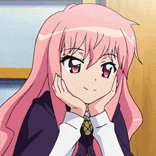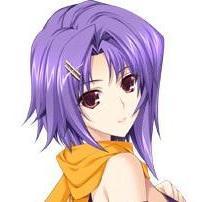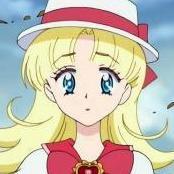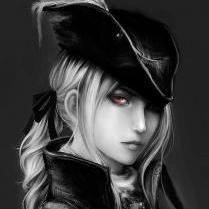Leaderboard
Popular Content
Showing content with the highest reputation on 09/20/20 in all areas
-

Reflecting on my Otaku Origins
Happiness+ and one other reacted to Clephas for a blog entry
I took my first steps onto the road of the otaku in 1992, when I watched the poorly dubbed (all dubs were godawful back then) Record of Lodoss War Volume 1 OVA VCR tape. Now, I was already a heavy fantasy addict, having been introduced to the Forgotten Realms and Dragonlance in 1990, and my obsession was at its peak at the time. When I watched Record of Lodoss War, I saw the typical 'elven maiden with human hero' romance in a new way (incidentally, this is a pretty typical romantic theme in those days, less so nowadays). I also saw oddities that stood out as odd to me precisely because of the oddly black and white point of view enforced on one by the various D&D universes. Of course, I was a chuunibyou brat by that time, already, so it should surprise no one that I got obsessed. It got ten times worse, however, when I encountered Chrono Trigger as it was played on my cousin's SNES. Chrono Trigger is still, to this day, one of the single best rpgs ever made. Looking back, considering all that has been done since then, it is almost TERRIFYING that someone was able to do what was done with Chrono Trigger with the limitations placed by using the SNES system. The story, the world, and the various layers of time were put together into such a subtly complex experience that, to this day, I've yet to see any other rpg manage it. Chrono Cross would manage to imitate some elements of this with its parallel world jumping, but Chrono Trigger's jumping around in time gave you impetus to explore how every aspect of the world could change based on how and when you did certain things. Rumors constantly abounded that there were secret endings (such as the infamous 'vampire Chrono' or 'Save Schala' fake rumors, which some believe led to the way the Chrono Cross storyline was handled), and people - such as me - would play the game repeatedly, using all the meager saves allowed by the cartridge limitations of the time, in hopes that they might trigger those endings or find a way to discover something new. In all honesty, Chrono Trigger being the game that got me into jrpgs probably ruined me for life. It set my standards to a ridiculously high level on a subconscious plane, resulting in me comparing every single jrpg experience since then to it. Aesthetically, musically, and structurally, it was a true jrpg kamige. It was also the game that turned jrpgs into my second otaku obsession. During the SNES-PS2 eras, I literally bought and played EVERY jrpg that came out. I still own them, in fact. I played most of the PS1 and SNES era games multiple times. However, it was also in the PS2 era (often called the 'dawn of the mainstream jrpg') that jrpg quality began to fall off drastically. The kind of genius and artistic flair using minimal resources you saw in previous eras was lost entirely within a few years of the release of FFX (FFX being a good game that also turned VO from a curiosity to a mainstream 'thing'). Musical direction, a role differing from composition, where someone was assigned to decide the timing of using a musical score and which ones fit which dungeons, which story scenes, disappeared in the middle of the PS2 era, as VO was used to fill the gaps of emotionality. However, this also meant that the subtlety of previous eras was lost with a swiftness that left me bewildered at the time. By the time the PS3 era came around, jrpgs were slowing down, due to what I now call 'flashy kusoge fatigue'. Oh, a few sub-genres, such as the Atelier series' alchemy obsessed SOL titles and the more action-based titles continued to be prolific, but what were called 'console-style rpgs' started to vanish. MMO elements were introduced into normal jrpgs, making progression and gameplay less interesting as a result (mostly because it seemed to have been done primarily to draw the WoW crowds into solo rpgs). Storytelling was dying a surprisingly swift death, as tedious gameplay elements (for loot and level-obsessed completionists) began to devour higher and higher proportions of each game's overall playtime. There is a very good reason why people go back and play so-called 'retro' jrpgs so much. There simply aren't that many more recent jrpgs that have that kind of flair and subtle genius. I know for a fact that one of the best ways to get people addicted to jrpgs is still just to let them play Chrono Trigger. Ironically, it was VNs that saved my soul. This was back in 2008, four years before I joined Fuwa. I was introduced to Tsukihime by a fellow anime fansubber, and, for the first time in over three years, I had something interesting enough (story-wise) that I was given a perspective on the nature of my growing irritation and fatigue with jrpgs in general. At the time, the JVN industry was still as vital and full of genius as the jrpg industry was in the PS1 era. Tsukihime and a few other major classics put out near the turn of the century had created the potential for a market of story-focused VNs that had allowed more and more creative people to get into the medium. Masada was releasing his latest version of Dies Irae, and there were literally hundreds of potentially interesting VNs for me to try. Needless to say, I lost my mind almost as badly as when I first played Chrono Trigger. I must have blown four grand of my meager savings on VNs within the first year, and I didn't regret a penny of it. Yes, roughly two-thirds of what I bought was pure crap. However, the gems I discovered gave me a taste of the potential of the medium in a way that was horribly addictive. Moreover, after a few years of being starved of any decent new stories, even the worst VNs had something that I could find I liked about them. In retrospect, I have an addictive personality. I get addicted to things easily, especially when they scratch my story bug. People have said to me, when it came to my jrpg obsession 'if you want a good story, why don't you read a book?', to which I usually gave them a blank stare and said 'I'm already reading good books. I just want stories in my games too.' Interestingly enough, there were a few bursts of true creativity in jrpgs in the years since, like Tales of Berseria and Nier: Automata, but they partially stand out due to the sheer bleakness of the genre landscape. People praise Octopath Traveler and Dragon Quest XI with intensity, and they practically worship Bravely Default. However, I have been shocked at how low-quality the presentation of these stories has been. It's like an entire generation has gotten used to ineptness in presentation to the point where they can be charmed by backhanded efforts at retro-nostalgia. Octopath has all the grind of the old SaGa Frontier games with none of the charm, the best part of each of the paths being at the beginning. Dragon Quest XI retains the horribly grindy nature of Dragon Quest games without improving on the formula in any real way. Moreover, locking so much content into the post-game annoys the hell out of me (I prefer new game +, obviously). JVNs have suffered their own decline, which is ironically due to the same demographics that inflated the medium in the first place (the dominance of the moe/charage lovers). VNs were always destined to be a niche medium, but the over-specialization of the industry has led to an inability to adapt to changing spending habits and demographics. Even if they wanted to regear for a new generation of consumers, most companies no longer have the access to the necessary talent to do so. I'm fairly sure that jrpgs suffer from a similar lack. Yes, there are some excellent composers and graphic designers in the jrpg industry, as well as access to the solid voice-acting industry of Japan and the growing one here in the US. However, there is a severe lack of writers capable of bringing a story to life, and there is no point in a top-tier OST that has no one to properly coordinate its use. The very fact that something like Undertale could bury so much of the commercial rpg industry, in the eyes of rpg fans, says everything about how far the industry has fallen. So what am I getting at? Not really anything, in truth. I just needed to blow off some steam. Thank you for reading.2 points -

What Video Games Are You Playing Right Now?
alpacaman and one other reacted to Kenshin_sama for a topic
I finished playing VA-11 Hall-A recently and it was quite enjoyable. The bartending mechanics were nicely woven into the story and surprisingly challenging at times. The protagonist, Jill, is adorable and relatable and made for an overall enjoyable experience in the game. She has these weird quirks that contrast with her serious demeanor and makes her all the more endearing. The rest of the cast also have some interesting personalities that kinda make them stand out in their own way, and it was interesting to hear about their views on society. I always made it a point to serve the right drink at the right time so I don't miss out on any good dialogue. Oh, and Dorothy is a lot of fun :3 The ending managed to make me cry a bit. It was bittersweet, but still left me feeling hopeful for Jill. I'm very much content with how things turned out overall and how well the game managed to leave an impression on me. The game may or may not need a guide depending on how observant you are, but some choices are just really difficult to get without one. That said, whenever I did find the most optimal answer, I'm always able to trace it back to subtle hints in the dialogue. If any of you go in blind for your first playthrough, I'd recommend paying extra careful attention to each client's preferences and to Jill whenever she talks about a drink's history. Thankfully the game is fairly forgiving on mistakes, so you'll be fine as long as you're not a total jerk. Overall, I highly recommend it!2 points -
I don't think I dare click on that spoiler box, since I really want to avoid anything that can either confirm or deny any of my theories ahead of time. I'm basically not looking for any sort of discussion at this point, but rather just jotting down thoughts as they come to me. I've been jumping back and forth between a lot of different theories and have a hard time deciding exactly what to believe. Some stuff seem to hold up pretty well, but then something shows up contradicting it or leading me onto a different track every so often. It was the same with Higurashi, but Umineko's mystery feels even harder to get a grasp on.1 point
-

List of VNs with official english release
bakauchuujin reacted to sid.vnlr for a topic
This is such an amazing post. Very well done, op.1 point -

What are you playing?
Templarseeker reacted to Eclipsed for a topic
Alright friends I'm sorry, I couldn't get into Ao Kana, I know, I know, blasphemy, it's one of the more favored high school slice of lifes out there, but I'm just waaay passed my SoL honey moon phase lol. Absolutely loved the artwork, and coupled with the flying thematics/settings I just know it would've been one of my tops alongside all the others I've red in the past. I can probably get back into it some other time, but after going through MuvLuv / Al Somnium Files / Chaos;Child / Utawarerumono this year I'm still hungry for some more plot heavy shenanigans rather than mindless eye candy moe droolzie fests. That being said, I did get another VN for my Switch in addition to Ao Kana: YU-NO. Now I didn't really read the synopsis for it, so when I was slogging through the prologue for a good 2-3 hours I was like uh oh, but then BAM it's a VN that involves timetravel/multiuniverse YEEE thank the VN gods! ~~ You are protagonist (first) Takuya Arima (last), an "acts obnoxious and perverted" high school boy who is kind of in a slump and slacking with his life and studies after his father, a fairly renowned researcher/historian, goes missing for a month and is eventually presumed dead. Takuya now lives with just his stepmother Ayumi, a very gentle and caring woman who's only about 10 years older than Takuya. Cuz she was a student of Takuya's dad and they fell in love. Whew. Takuya is an obnoxious loudmouth, and 50% of his dialogue with any female character is plagued with early 2000s perverted protagonist humor; hopefully he'll grow out of it in some semblance of character development come later. He even pervs out on his stepmother Ayumi at times lol, but at least he's mindful about that: Yo dw Takuya, I won't judge, you're only looking because I'm making you, because I'm the one who wants to stare Yada yada yada, Takuya eventually gets a package delivered to him. The sender? His father! And inside is the deus ex machina of deus ex machinas, your very own time machine device! Now YU-NO came out in 1996, so it's the OG time travel/multiverse VN and I'm going to just enjoy it for what it is instead of trying to compare it with Steins;gate / Zero Escape and whatnot. So far I dig the concept, you know how VNs have flow charts and save points? These are seamlessly implemented as a natural feature of Takuya's time travel device so he can set a jewel (checkpoint) and jump between them at will, though he only has a limited amounted of jewels (checkpoints) to place. Basically you using this limited saving or loading feature is him using his time machine device, pretty meta for a VN made in 1996. The only drawback so far is that it doesn't seem like Takuya himself is aware of any jumps you're doing early on in the story, though I'm assuming come late game it'll probably be heavily integrated with the plot. The VN narratively plays like a point and click adventure, where you are given breaks in between dialogue to move to your next destination or examine your surroundings. Pretty neat feature, though I've already developed the habit of holding skip and clicking everything in the map and then glancing through backlogs, because there is a LOT of fluff / boring descriptions: Yuck, too much stuff to examine. Doesn't help that you can literally leave the room and come right back and then all the things you just greyed out (indicating that it was read content) will be white again (unread content). ~~ Naturally I'm playing the remastered Nintendo Switch version of YU-NO. It comes with remastered tracks (though you can change the BGM to the OG 8-bit sounding ones at any time, always nice to have that feature) and modern moe graphics, which I always love so that's a plus. I saw some comments about diehard purist fans going 'Ohh the old artstyle was better, the new one is lifeless'/ Well i say y'all needa get your eyes checked and get with the times, I bet there are even OLDER purists who would think black and white pixelated pre-1970s artstyle trumps the old 2000s janky artstyle lol. Yes, I had Takuya stare at her butt. For the longest time ever. Sue me ~~ Pretty interested to see what kind of story this VN will do1 point -

VN of the Year 2008 and POLL for EXTRA review
Chronopolis reacted to kivandopulus for a blog entry
Year 2008 started with two failed months, continued strong, but by the end lost a lot of appeal for me. There is not a single full 10/10 masterpiece (although technically Dies irae reworked version may be counted), but the overall number of masterpieces is again 20, exactly the same as in 2007, so can't complain here. New portion of Visual Novel Openings 2008 with songs. My list of masterpieces in 2008: 11eyes -Tsumi to Batsu to Aganai no Shoujo- 12Riven -The Ψcliminal of Integral- 428 ~Fuusa Sareta Shibuya de~ Aion Garden Aoishiro Bifronte ~Kugaitou Kitan~ Chrono Belt ~Ayakashibito & Bullet Butlers Crossover Disc~ Concerto Note Eien no Owari ni G-senjou no Maou Gouen no Soleil -Chaos Region- Kagerou Touryuuki Kara no Shoujo Nidaime wa ☆ Mahou Shoujo Princess Frontier Rui wa Tomo o Yobu Sora o Tobu, 3tsu no Houhou Sumaga Tri☆Stars Volume 7 A number that becomes magical for each year. Wanted to catch up with micchi blog that started monthly overviews in late 2008, and I'm finally there. As for VN of the Year, i'd nominate 12Riven -The Ψcliminal of Integral- . Covered three years in visual novels over these eight months, but now I'm taking a month or so break from new posts - will rest, update old posts with newly added works and fulfill a number of youtube requests to add leftover routes. See you somewhere in October. But last post before the short break will be extra review for the year 2008, of course. Traditionally, adding here untranslated masterpiece games that I did not pick up for review throughout the year, and if five slots aren't filled, getting some curious non-masterpieces in addition. Let's choose an EXTRA review for 2008 in this poll: Concerto Note Sin Kurotoki Iro no Shoujo Sora o Tobu, 3tsu no Houhou Sumaga Wizard Girl Ambitious1 point -

永遠の終わりに Eien no Owari ni [Tama-Soft]
Chronopolis reacted to kivandopulus for a blog entry
Foreword: There was very limited selection of games to choose from in December, but I chose Eien no Owari ni because of phrase unfinished masterpiece that I glanced in some review. The fact that Tama-Soft made Lost Child also matters a lot for me. Synopsis: There is a high school that will be closed down soon - one day, Keisuke transfers to that very specific school. On his first day, he visits the newspaper club, but Ryo, the club's leader, acts very coldly towards him. He soon finds out that the club has been doing nothing due to lack of club members. For some reason, the members are also very distant from each other... He gets interested in their strange relationship and decides to join the club. After joining, the atmosphere of the club gradually changes and their new relationship is established. However, he accidentally gets to know the reason why the members used to be distant to each other. It happened just when he transferred to the school... Youtube:https://www.youtube.com/playlist?list=PLs4Gp5VU4Fv9HyOG7idnOMuKaGgSeqEFs Game type: Growth mystery nakige Character Design rating: 8/10 Protagonist rating: 7/10 Story rating: 7/10 Game quality: 5/10 Overall rating: 7/10 In the end it's a SOL nakige with a twist of mystery, so just not a fitting genre for me, but still a masterpiece! It usually says a lot. It's rare to find something original and with human-like heroines in nakige, but it's exactly such case. But let's not jump to conclusions before the main part. Concept is actually unusual. I can't avoid minor spoilers which are needed to promote uniqueness of this game. So Keisuke comes to school and tries to unite newspaper ghost club who suddenly broke apart after some incident last year. And first week of the game is just perfect, a supreme masterpiece. Then during second and third week nothing really new happens, and at all ends in super aggressive development and denouement. As for scenario parts, we start as Keisuke, but then after flagging a heroine we suddenly turn into past with another protagonist Keiichi. And we already know that something bad happened to Keiichi, which resulted in club stopping activities. And we eventually get to the point when this something bad happens. But afterwards we get to present already, but we can't be sure of protagonist identity anymore. It might be Keisuke, might be Keiichi, might be the same person. Keisuke disappears from everyone's memory. It remains as a big mystery. And basically in this game past determines future. Past incident is different for each heroine, so future differs greatly, but considered the bad incident it's unwise to expect a happy ending. There are a lot of downsides of this game, hence the unfinished masterpiece label. Engine is even worse than in Lost Child in my opinion. I did not find text speed settings, so in the end text drew not instantly for me, and with higher than needed speed. Scenario is not impressive and has inconsistencies of common route with individual routes due to multiple scenario writers. Heroines are not flashy and lack charm. There are a lot of colorful side-characters, but none of them has voicing, so silence can last for a long time. Hozuki route is significantly shorter than the other two, and since Hozuki route is supposed to be the last, it creates a bad aftertaste. Absence of happy ending does not help evaluation either. There are only three routes which is below standard of four-five nowadays. No true route. In game's defense, it is able to nurture sense of uniqueness and present great nostalgia atmosphere and bgm. First week is the paragon of an inspiring beginning. Game is able to remain mysterious thanks to the false protagonist move. Heroines in this game are very human-like, not tied by any cliche. Clumsy relations with these heroines are really cute. It's very rare nowadays when creators realize the inevitable bad impression, but stay true to their concept and don't introduce standard elements to appeal to everyone. Eien no Owari is the last and lesser known game of Tama-Soft, but discovering such gems is twice as pleasant.1 point -
and here i though the pc patch for another game is just moving the patch file into atmosphere folder like this one , turns out its really hard . thx for answering anyway and good luck if you try to patch maitetsu too , i'll be cheering you . having console when you can play uncensored game is really blessing1 point
-

Wagamama High Spec
Ottozinho reacted to littleshogun for a topic
Wagamama High Spec Summary The story revolves around Narumi Kouki, a high school student who also draws a manga serialized in a weekly magazine. Because the manga he draws is a risqué romantic comedy, he keeps this fact a secret from everyone around him, with his younger sister Toa and his sister's best friend Mihiro being the only ones who know. But one day, as the student council president Rokuonji Kaoruko is searching for male members for the student council, she finds out that Kouki is the manga's author. Kouki joins the student council in exchange for Kaoruko not revealing his secret. However, the vice president, Sakuragi R. Ashe, strongly opposes him joining, and in the midst of all this, various requests and troubles of students begin to pile up. Ending Guideline / Suggested Route Order This VN has four heroines, Ashe, Kaoruko, Toa, and Mihiro. Since this is charage, there's no locked route there so feel free to play whatever the route that you want first. Route Guideline Rokuonji Kaoruko Sakuragi Roofolet Ashe Narumi Toa Miyase Mihiro Attribution This walkthrough is based on the walkthrough at Otaku Lair with some adjustment made by myself.1 point



